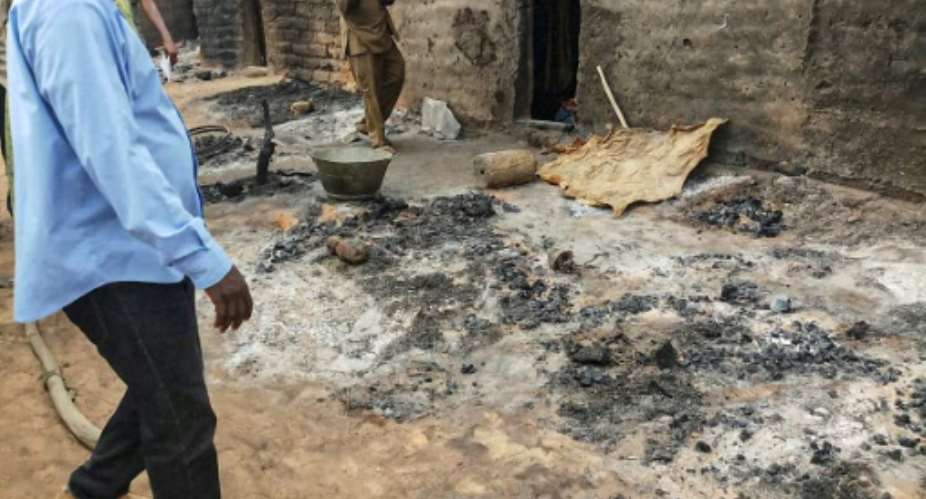The prime minister of Mali visited the site of one of the country's worst massacres on Tuesday, seeking to reassure terrified residents after an attack that left scores of dead and stoked fears for the fragile Sahel country.
The assault, targeting a village in largely ethnic Dogon enclave in central Mali, bore the hallmarks of a cycle of inter-community violence that has pitted farmers against herders, claiming hundreds of lives.
Ninety-five people were killed, according to an early toll that remained unconfirmed on Tuesday.
Premier Boubou Cisse visit sought to "convey the support of the nation and check that security measures have been strengthened," his office told AFP.
 A brutal cycle of ethnic violence that has claimed hundreds of lives across the region, pitting farmers against herders. By MICHELE CATTANI (AFP/File)
A brutal cycle of ethnic violence that has claimed hundreds of lives across the region, pitting farmers against herders. By MICHELE CATTANI (AFP/File)
The attack on the village of Sobane Da -- also called Sobane-Kou -- began on Sunday evening and continued well into the night, according to witnesses.
Survivors described attackers arriving on motorbikes and in trucks and surrounding the village, slaughtering anyone who tried to escape.
A provisional death toll of 95 was given by the government on Monday, although this could be revised, with different officials giving varying figures.
On Monday a security source said the Dogon village had been "virtually wiped out".
The killing came less than three months after nearly 160 members of the Fulani ethnic group were slaughtered by a group identified as Dogon.
President Ibrahim Boubacar Keita cut short a visit to Switzerland and was expected to return to Bamako Tuesday.
"This country cannot be run by a cycle of revenge and vendetta," he told ORTM public television in Geneva on Monday.
He called on Malians to unite to "allow our nation to survive, because this is a question of survival."
Ethnic tensions
A brutal cycle of violence in central Mali, an ethnic mosaic, began after a predominantly Fulani jihadist group led by preacher Amadou Koufa emerged in 2015.
Jihadists recruited mainly from Fulanis. As a result, Fulanis became associated with Islamist violence, which fuelled tensions with other ethnic groups such as Bambara and Dogon.
The Fulani are primarily cattle breeders and traders, while the Bambara and Dogon are traditionally sedentary farmers.
 Map locating Sobane-Kou in Mali, where 95 people were killed during an attack overnight Sunday to Monday.. By AFP (AFP)
Map locating Sobane-Kou in Mali, where 95 people were killed during an attack overnight Sunday to Monday.. By AFP (AFP)
Aly Dolo, the mayor of Sangha, the district where the massacre occurred, described the attackers as "jihadists".
"When they arrived, we initially thought of cattle thieves. The residents hid in their huts. The assailants attacked these huts and set them on fire," he said.
Malian researcher Ousmane Diallo, a specialist on the region, said the details of the attack suggested "jihadist methods."
 There are currently about 14,700 troops and police deployed in Mali. By MICHELE CATTANI (AFP/File)
There are currently about 14,700 troops and police deployed in Mali. By MICHELE CATTANI (AFP/File)
But he cautioned that the reality might be more complex, and that the attackers' motivations remained unclear.
On May 16, the UN peacekeeping mission in Mali, MINUSMA, announced it had recorded "at least 488 deaths" in attacks on Fulanis in the central regions of Mopti and Segou since January 2018.
In the bloodiest raid, about 160 Fulani villagers were slaughtered on March 23 at Ogossagou, near the border with Burkina Faso, by suspected Dogon hunters.
According to MINUSMA, armed Fulanis had "caused 63 deaths" among civilians in the Mopti region, also since January 2018.
There are currently about 14,700 troops and police deployed in Mali, which ranks as the most dangerous UN mission, with 125 peacekeepers killed in attacks since deployment in 2013.





 Dumsor: Don't rush to demand timetable; the problem may be temporary — Atik Moha...
Dumsor: Don't rush to demand timetable; the problem may be temporary — Atik Moha...
 Space X Starlink’s satellite broadband approved in Ghana — NCA
Space X Starlink’s satellite broadband approved in Ghana — NCA
 2024 election will be decided on the grounds of the economy; choice of running m...
2024 election will be decided on the grounds of the economy; choice of running m...
 Dumsor: We're demanding less; just give us a timetable — Kwesi Pratt to ECG
Dumsor: We're demanding less; just give us a timetable — Kwesi Pratt to ECG
 Do I have to apologise for doing my security work, I won’t – Simon Osei-Mensah r...
Do I have to apologise for doing my security work, I won’t – Simon Osei-Mensah r...
 All my businesses have collapsed under Akufo-Addo — NDC Central regional chair
All my businesses have collapsed under Akufo-Addo — NDC Central regional chair
 Military, Prison Officers clash in Bawku, three injured
Military, Prison Officers clash in Bawku, three injured
 GRA-SML contract: MFWA files RTI request demanding KPMG report
GRA-SML contract: MFWA files RTI request demanding KPMG report
 Court threatens to call second accused to testify if NDC's Ofosu Ampofo fails to...
Court threatens to call second accused to testify if NDC's Ofosu Ampofo fails to...
 Family accuses hospital of medical negligence, extortion in death of 17-year-old...
Family accuses hospital of medical negligence, extortion in death of 17-year-old...
